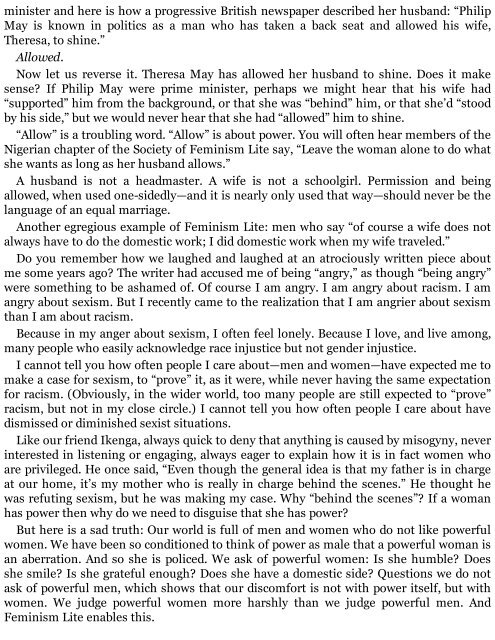You also want an ePaper? Increase the reach of your titles
YUMPU automatically turns print PDFs into web optimized ePapers that Google loves.
minister and here is how a progressive British newspaper described her husband: “Philip<br />
May is known in politics as a man who has taken a back seat and allowed his wife,<br />
Theresa, to shine.”<br />
Allowed.<br />
Now let us reverse it. Theresa May has allowed her husband to shine. Does it make<br />
sense? If Philip May were prime minister, perhaps we might hear that his wife had<br />
“supported” him from the background, or that she was “behind” him, or that she’d “stood<br />
by his side,” but we would never hear that she had “allowed” him to shine.<br />
“Allow” is a troubling word. “Allow” is about power. You will often hear members of the<br />
Nigerian chapter of the Society of Feminism Lite say, “Leave the woman alone to do what<br />
she wants as long as her husband allows.”<br />
A husband is not a headmaster. A wife is not a schoolgirl. Permission and being<br />
allowed, when used one-sidedly—and it is nearly only used that way—should never be the<br />
language of an equal marriage.<br />
Another egregious example of Feminism Lite: men who say “of course a wife does not<br />
always have to do the domestic work; I did domestic work when my wife traveled.”<br />
Do you remember how we laughed and laughed at an atrociously written piece about<br />
me some years ago? The writer had accused me of being “angry,” as though “being angry”<br />
were something to be ashamed of. Of course I am angry. I am angry about racism. I am<br />
angry about sexism. But I recently came to the realization that I am angrier about sexism<br />
than I am about racism.<br />
Because in my anger about sexism, I often feel lonely. Because I love, and live among,<br />
many people who easily acknowledge race injustice but not gender injustice.<br />
I cannot tell you how often people I care about—men and women—have expected me to<br />
make a case for sexism, to “prove” it, as it were, while never having the same expectation<br />
for racism. (Obviously, in the wider world, too many people are still expected to “prove”<br />
racism, but not in my close circle.) I cannot tell you how often people I care about have<br />
dismissed or diminished sexist situations.<br />
Like our friend Ikenga, always quick to deny that anything is caused by misogyny, never<br />
interested in listening or engaging, always eager to explain how it is in fact women who<br />
are privileged. He once said, “Even though the general idea is that my father is in charge<br />
at our home, it’s my mother who is really in charge behind the scenes.” He thought he<br />
was refuting sexism, but he was making my case. Why “behind the scenes”? If a woman<br />
has power then why do we need to disguise that she has power?<br />
But here is a sad truth: Our world is full of men and women who do not like powerful<br />
women. We have been so conditioned to think of power as male that a powerful woman is<br />
an aberration. And so she is policed. We ask of powerful women: Is she humble? Does<br />
she smile? Is she grateful enough? Does she have a domestic side? Questions we do not<br />
ask of powerful men, which shows that our discomfort is not with power itself, but with<br />
women. We judge powerful women more harshly than we judge powerful men. And<br />
Feminism Lite enables this.
















